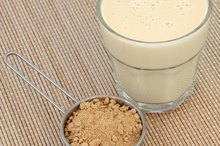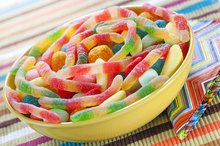What does fact checked mean?
At Healthfully, we strive to deliver objective content that is accurate and up-to-date. Our team periodically reviews articles in order to ensure content quality. The sources cited below consist of evidence from peer-reviewed journals, prominent medical organizations, academic associations, and government data.
The information contained on this site is for informational purposes only, and should not be used as a substitute for the advice of a professional health care provider. Please check with the appropriate physician regarding health questions and concerns. Although we strive to deliver accurate and up-to-date information, no guarantee to that effect is made.
Liquid Supplements for Weight Gain
If food alone isn't making you gain weight, consider a liquid supplement. Liquid calories are not as filling as solid food, but these supplements may help you get the extra calories you need to gain. They're a good source of calories, and many also supply vitamins and minerals. Consult your doctor to discuss the best weight-gaining drink for you.
Benefits of Liquid Supplements
Liquid supplements add calories to pack on pounds if you are underweight and struggling to gain, you have a high metabolism, or you simply can't meet your daily calorie needs to gain weight for some reason. Athletes and bodybuilders may also turn to liquid supplements to help them add the calories needed to promote muscle gain.
According to a 2002 study published in The American Journal of Clinical Nutrition, for weight gain, you should drink liquid supplements in between meals so as not to affect your appetite at mealtime 1.
- Liquid supplements add calories to pack on pounds if you are underweight and struggling to gain, you have a high metabolism, or you simply can't meet your daily calorie needs to gain weight for some reason.
- Athletes and bodybuilders may also turn to liquid supplements to help them add the calories needed to promote muscle gain.
Liquid Meal Replacement Supplements
Weight-Gain Supplements for a High Metabolism
Learn More
Liquid meal replacement supplements, which are typically recommended by healthcare professionals, are available at most supermarkets, pharmacies and big box stores. These supplements contain 220 to 350 calories per 8-ounce serving, depending on the brand and type. They also contain a balanced mix of carbs, protein and fat, along with most of the essential vitamins and minerals 7. If you have a poor appetite or simply can't eat enough of the right foods to gain the weight you desire, meal replacement drinks may be the right option for you. Some manufacturers of these products also offer liquid supplements for specific disease states, such as diabetes and kidney disease. While meal replacement liquid supplements are convenient, they are also somewhat pricey.
- Liquid meal replacement supplements, which are typically recommended by healthcare professionals, are available at most supermarkets, pharmacies and big box stores.
- Some manufacturers of these products also offer liquid supplements for specific disease states, such as diabetes and kidney disease.
Weight Gainer Liquid Supplements
Weight gainer liquid supplements, marketed to athletes and bodybuilders, are usually found in health food stores or vitamin shops. Like liquid meal replacements, weight gainers contain a mix of carbs, protein and fat; however, they may also contain specific amino acids, herbs or other supplements touted as beneficial to those aiming to increase muscle mass 7. Weight gain liquid supplements are found in both ready-to-drink and powdered form. Calories vary greatly, ranging from 220 calories in an 8-ounce ready-to-drink supplement to 1,340 calories in two scoops of a powdered mix.
- Weight gainer liquid supplements, marketed to athletes and bodybuilders, are usually found in health food stores or vitamin shops.
- Like liquid meal replacements, weight gainers contain a mix of carbs, protein and fat; however, they may also contain specific amino acids, herbs or other supplements touted as beneficial to those aiming to increase muscle mass 7.
Protein Powders and Weight Gain
Precision Engineered Muscle & Weight Gainer
Learn More
Protein powders are not the same as weight gainers; instead, these products typically contain only protein and sometimes small amounts of carbs and fat 7. While they are a source of calories, they may not contain as many calories as a meal replacement supplement or weight-gainer formula. Plus, they are not a balanced source of nutrition, which is important for weight gain, even when you're trying to bulk up 1.
Homemade High-Calorie Drinks
While liquid supplements are a convenient source of calories, they are somewhat expensive. If you're trying to gain weight on a budget, you may be able to create your own high-calorie liquid supplement with food in your fridge and pantry. Blend 1 cup of whole milk with 2 tablespoons of peanut butter and a large banana for a 460-calorie shake. For a thicker shake with 330 calories, blend 6 ounces of nonfat Greek yogurt with 1 cup of sliced strawberries, 1/4 an avocado and 1/2 cup of 100 percent orange juice.
- While liquid supplements are a convenient source of calories, they are somewhat expensive.
- If you're trying to gain weight on a budget, you may be able to create your own high-calorie liquid supplement with food in your fridge and pantry.
Related Articles
References
- Academy of Nutrition and Dietetics: Healthy Weight Gain
- Abbott Nutrition: Nutritional Products
- Human Kinetics: Get the Facts About Weight-Gain Powders
- GNC: Muscle Milk Products
- GNC: NC Pro Performance Bulk 1340 - Vanilla
- GNC: Protein
- Schwartz, R. S., Ravussin, E., Massari, M., O'Connell, M., & Robbins, D. C. (1985). The thermic effect of carbohydrate versus fat feeding in man. Metabolism, 34(3), 285-293.
- Tappy, L. (1996). Thermic effect of food and sympathetic nervous system activity in humans. Reproduction Nutrition Development, 36(4), 391-397.
- Schoenfeld, B. J. (2010). The mechanisms of muscle hypertrophy and their application to resistance training. The Journal of Strength & Conditioning Research, 24(10), 2857-2872.
- Gentil, P., Soares, S., & Bottaro, M. (2014). Single vs. Multi-joint resistance exercise: effects on muscle strength and hypertrophy. Asian Journal of Sports Medicine, 6(2).
- Leproult, R., Copinschi, G., Buxton, O., & Van Cauter, E. (1997). Sleep loss results in an elevation of cortisol levels the next evening. Sleep: Journal of Sleep Research & Sleep Medicine, 20(10), 865-870.
- Volek, J. S., Duncan, N. D., Mazzetti, S. A., Staron, R. S., Putukian, M., Gomez, A. L., ... & Kraemer, W. J. (1999). Performance and muscle fiber adaptations to creatine supplementation and heavy resistance training. Medicine and Science in Sports and Exercise, 31, 1147-1156.
- Brilla, L. R., & Conte, V. (2000). Effects of a novel zinc-magnesium formulation on hormones and strength. Journal of Exercise Physiology Online, 3(4), 26-36.
- Brilla, L. R., & Haley, T. F. (1992). Effect of magnesium supplementation on strength training in humans. Journal of the American College of Nutrition, 11(3), 326-329.
Resources
Writer Bio
Jill Corleone is a registered dietitian and health coach who has been writing and lecturing on diet and health for more than 15 years. Her work has been featured on the Huffington Post, Diabetes Self-Management and in the book "Noninvasive Mechanical Ventilation," edited by John R. Bach, M.D. Corleone holds a Bachelor of Science in nutrition.









